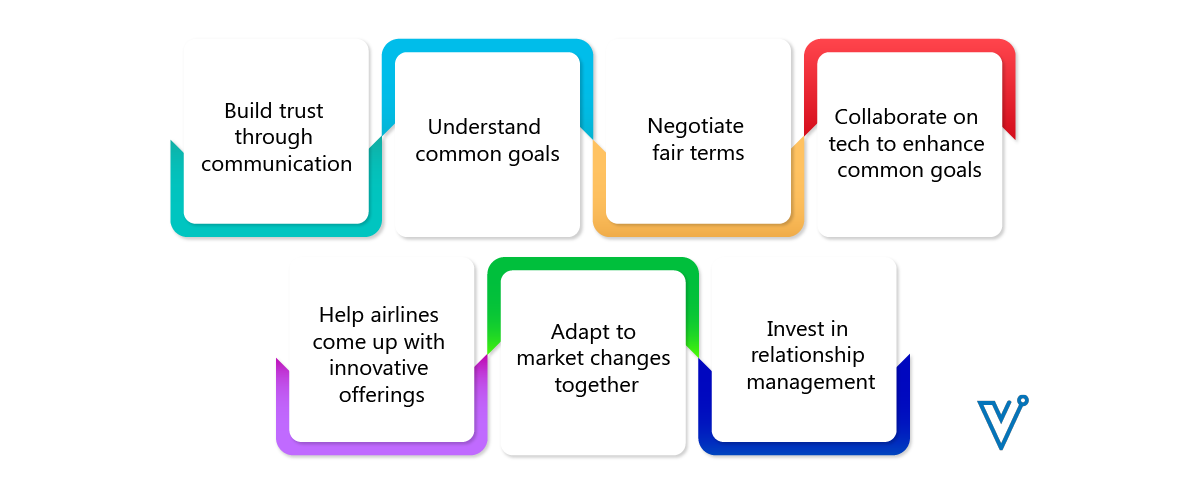Online travel agencies have been one of the primary sources of airline distribution for more than 2 decades. They account for over a third of all online airline bookings and are efficient at selling flights and reaching customers. Airlines may need help to get on their own.
But in this state of the airline industry, with record load factors and profit margins, airlines gradually depend more on OTAs and vice versa.
Many airlines need proper relationships with OTAs. In several cases, they don’t engage the OTAs for fear of getting taken advantage of. But as an OTA, the buck stops with you to manage this relationship for sustained success.
Seven Tips for OTAs to Manage Relationships with Airlines
As an OTA, the airlines are your strategic partners. The tactical measures won’t help the cause; you must think long-term. How you see the relationship growing over the years, there is no straight tea to it. Yet, certain denominators can go a long way in managing this relationship. Here, we talk about seven of them.

Build trust through communication:
Effective communication forms the foundation of any successful relationship. Initiate regular and transparent contact with airline representatives. Share insights about your customer base, booking trends, and market demands. It builds trust and allows airlines to alter their services to meet their customers’ needs better.
Understand common goals:
A successful partnership is one where both parties gain something. Take the time to comprehend the airline’s business objectives and communicate independently. Finding common ground can create mutually beneficial strategies that enhance your brand and the airline’s reputation.
Negotiate fair terms, A win-win agreement:
When it comes to establishing contracts and agreements, fairness is critical. Negotiate reasonable terms that reflect the value each party brings to the table. It includes discussing commission rates, marketing support, and any exclusive offerings. A balanced agreement sets the stage for a long-lasting and fruitful partnership.
Collaborate on tech to enhance common goals:
Customer Experience is a differentiator that benefits your OTA and the airlines you work with. It’s a common goal. Collaborate on technological advancements you achieve on the front booking processes and pass on the benefits to airlines. And you can ask airlines for demand data to serve better CX through cycles.
Help airlines come up with innovative offerings:
As an OTA, you have access to deep data on traveler preferences and behaviors. You can share this information with your airline partners to help them enhance their offerings. The customer insights you contribute to help Airlines develop more innovative offerings that ring a bell with fliers, which, apart from good marketing, also bring more bookings.
Adapt to market changes together:
The travel industry is highly susceptible to external factors, such as economic shifts, global events, and technological watersheds. Stay adaptable and work closely with your airline partners to get through these changes. Flexibility and collaboration will help both parties weather challenges and capitalize on emerging opportunities.
Invest in relationship management:
Building and maintaining solid relationships requires ongoing effort. Dedicate resources to relationship management, ensuring you have dedicated personnel responsible for nurturing connections with airline partners. Regular check-ins, feedback sessions, and collaborative brainstorming can foster a sense of partnership that goes beyond the transactional.
As we mentioned earlier, GDPR compliance is not a checkbox; it’s a pledge to customer data security. It’s an opportunity for OTAs to redefine their narrative, positioning themselves as compliant entities and pioneers in ethical data management. Beyond mitigating risks, GDPR compliance becomes a strategic necessity, which opens doors for OTAs to establish themselves as customer-first businesses that value their trust.







